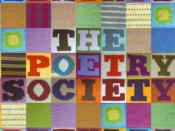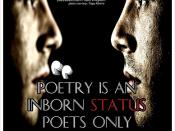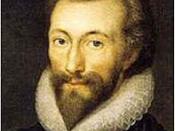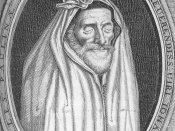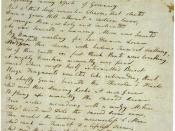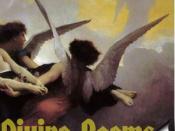It was the ingenuity and unconventionality Of Donne's poetry that impressed his contemporaries. His change in style from the flamboyant and lavish Elizabethan verse to a type of poetry that captured the energy of life and lovers, created an entirely new form of literature. Although primarily famous for his intellect and wit, Donne also had a cunning ability to dramatise the human voice and create speakers within his poetry. Nineteenth-century writers including Samuel Taylor Coleridge and Thomas DeQuincey appreciated Donne's lack of reserve and stylistic experimentation, celebrating his works as brimming with life and filled with primeval emotion. This was achieved through a type of dramatic monologue within his poetry.
Donne creates a dramatic situation and the poem spells out the action. The voices of his poems range from bawdy lusty men to platonic and complimentary lovers. His ability to dramatise the intonations of the human voice created a new kind of poetry from the Renaissance love lyric in which the lovers lament and dissect their feelings, seemingly alone.
Instead in many of his secular poems Donne creates a voice, expressing feeling usually directly to a lover or listener. Fowkes points out in his introduction, "Very few of the love poems are soliloquies; most are addressed to an imagined hearer." Even major critics of the twentieth century-including T. S. Eliot, Lionel Trilling, and Cleanth Brooks-acknowledged Donne's ability to capture the human experience in poetry. We are able to share this human experience as the dramatisation adds a visual element to his poetry. Donne allows his readers to picture the scene before them, making his poems more like plays being acted out in front of us. There are characters and plots, speakers and listeners, intermingled with the imagery, metaphors and conceits. These listeners can even affect the flow of the poem as demonstrated in "The Flea," perhaps Donne's most obvious use of dramatisation. Donne writes with colloquial voices demonstrated in the pretended outbursts,"I wonder by my troth.." "Busy Old foole" and "For God's sake hold your tongueâ¦" and the more subdued yet imtimate address to the reader, "Tis the year's midnight" which is equally characteristic of speech. I will talk about each of these poems in turn but primarily, \The Flea.
There is a clear voice speaking in the poem, a lusty male trying to convince his lover to sleep with him through a ridiculous conceit of a flea bite. The poem opens with a direct address,"Mark but this flea, and mark in this,How little that which thou deniest me is"The speaker is lecturing his lover and is in a situation most young men might sympathise with. He wants to have sex with her but the feeling is not mutual. She is utterly unimpressed with his argument that the loss of her virginity would be no worse than the flea biting them both. Donne created an almost comic situation as the male pulls off his most intellectual argument but is getting nowhere despite his elaborate speech. The action is expressed through the voice as he cries out "O stay" at the beginning of the second stanza in which we presume she is threatening to kill the flea. Donne purposefully speeds up the tempo of the speaker as he must change her mind and improve the quality of his argument,"This flea is you and I, and thisOur marriage bed, and marriage temple is."Here Donne is expressing his dramatic flair at it's best. The speaker seems to get carried away with his own audacity as the rhythm of the poem allows him to gallop on with his argument, without stopping for even a breath it seems, never mind allowing her to argue back.
The third stanza is the final act of this "three act play" as the lady kills the flea despite his appeal. Here the speaker comically adopts a wounded tone and acts the frustrated male,"Cruel and sudden, hast thou sincePurpled thy nail in blood of innocence?"In the final few lines the speaker appears to gloat in his final argument that the girl having sex with him in terms of her honour would be no less harmful than when she killed the flea. He has won the argument despite not convincing her and so we can laugh at his attempt to impose a rational explanation for her loss of virginity. The dramatic outbursts at the beginning of each stanza show a distinct voice and allow us to almost witness the events unfolding though they are not specifically mentioned in the poetry like stage directions might be within a play.
When a knowledge of Donne's personal experiences in life are understood, it might be easy to assume the speaker in the poems is himself at various points in his career. For examply the Flea displays not only Donne's reputation as a womaniser but also his love of showing of his intellectual prowess. The secular love poetry was perhaps written when he was a young lusty man and the religious poetry when he turned Anglican and abandoned and repented the sinfulness of his youth. We must take extreme caution not to "neatly compartmentalise according to apparent phases of his life." It cannot be said that his poems were entirely autobiographical and the I feel it is the different speakers of his poetry that allow variety of situations and enable Donne to use many different types of conceits to express a whole spectrum of feelings related to love. The poem Break of Day which starts," 'Tis true, 'tis day: what though it be?O wilt thou therefore rise from me?"Is quite clearly the voice of a woman and so it cannot be said that Donne is always writing from personal experience.
The speaker in Valediction: Forbidden Mourning shows more reputable qualities than the speaker in the Flea. He is tender, affectionate and reassuring in this poem about a temporary parting of lovers. He asks that they say goodbye quietly and calmly without the fuss of tears and sighs. He justifies a quiet separation as a proof of their holy love, elevated above that of ordinary lovers. He does this in a conversational tone and addresses her sweetly,So let us melt, and make no noise,no tear-floods, nor sigh-tempests move;'Twere profanation of our joys.
To tell the laity our love.
Here Donne dramatises the human voice so that the reader can almost picture him caressing her hair and whispering these reassurances as she laments his departure. A clear voice can be heard which expresses thought, feeling and the kind of pure emotion that makes his poetry stand out.
The simple form of the poem, in nine quatrains, a four beat, iambic tetrameter line and simple alternating rhyme scheme, help the poem to flow smoothly. This creates a sense of gentleness of voice as the speaker soothes his lover. In its inhibition of emotional display the poem is purposefully different to Valedictory: Of Weeping for example, where the lover's tears and sighs are central to the conceit of the poem and create a sense of ingenuity of love. Not only does Donne ask his lady to show restraint in this poem but shows restraint himself through simple choice of syntax and form, uncharacteristic of Donne who often creates elaborate forms of stanza and rhyme. Here he allows the conversational tone and gentle flow create the sense of drama in this somewhat subdued situation of saying goodbye. Interjections of "But we" and "Thy soul" further demonstrate the sense of a speaker and listener. The voice in the last stanza (referring to the conceit of their connected souls alike to a pair of compasses) is effective in completing the poem in their final dramatic farewell as the speaker sums up,Such wilt thou be to me, who must,Like th' other foot, obliquely run;Thy firmness makes my circle just,And makes me end where I begun.
The emotional intensity of their farewell is brought out by Donne's ability to dramatise poetry. .It is the perfect example of mutual love in which Donne's lovers "rejoice in the compatibility of their sexual and spiritual love and seek immortalityfor an emotion that they elevate to an almost religious plane." This is just one type of emotion Donne is able to dramatise successfully. The tone is consistent throughout and displays a sense of genuine love, much like The Good Morrow,"I wonder by my troth, what thou. And IDid till we lov'd?"The use of personal pronouns, "thou", "I" and "we" emphasise the sense of two lovers together in a joint experience. Donne uses the imperative mood of the verb in his conceit of her being his world,"Let sea-discoverers to new worlds have gone,Let maps to others, worlds on worlds have shown,Let us possess one world, each hath on , and is one."The dramatic voice is clear as he expresses how much she means to him. Donne is able to combine intellectual ideas and conceits with the human experience. He is not simply meditating logical arguments but is a lover being extremely complimentary to his lady, especially since he must expect her to be able to reach his intellectual plane in understanding his compliments. This disproves the criticism that Donne is always derogatory towards women.
Another poem in which the speaker attempts to express the extent of his feelings is witihin The Sun Rising. Here the speaker refers to his mistress with pride and admiration, even to the point of boastfulness, making hyperbolic claims. These could be taken as extremely complimentary or too ridiculous to be sentimental. Either way Donne once again uses a dramatic situation and a speaker to write his poetry. The most obvious example of dramatic flair is the outburst of feeling that begins the sun rising"Busy old fool, unruly sun,Why dost thou thusThrough windows and through curtains call on us?"The phrasing of the first stanza is almost entirely the idiom of spoken English . The poem is set in familiar surroundings, in an everyday situation, two lovers waking up in bed together. For this reason Donne's use of simple language and form signify a common human feeling and experience. His objects, a window and bed, are taken from a real situation so there is no need for flowery metaphors and prestigious language so common in Elizabethan poetry. The speaker is direct and vocabulary used, basic, in order to express the actuality of the two lovers in bed. Again Donne uses the imperative mood of the verb,"Go tell court-huntsmen that the king will ride,Call country ants to harvest offices."This creates the illusion of an individualised dramatic voice seeking, in this case, the sun's attention but in his other poetry it might be the reader's attention, his lover or even God's attention he seeks. In this way he creates a sense of urgency in what he has to say. The illusion here is that the speaker is experiencing some form of emotion, perhaps even verging on the edge of emotional control. This adds to the dramatic intensity of the poetry yet despite the appearance of such a sense of urgency and lack of control, Donne's writing is still completely controlled. This is displayed perfectly in The Sun Rising in which he is able to render a preposterous argument, plausible.
A Nocturnal Upon St Lucies's Day has a very different tone from the others and is brimming with death. When referring to the poem, James Winny says that Donne's,"emotional impact is brought about by its colloquial directness. The speaker seems to make no concessions to formal literary style, but to blurt out his feelings with the choking impatience or excitement of a man too deeply abosorbed in his private experience."Here Winny expresses how Donne brings out raw emotion in his poetry through the dramatisation of voice,I needs must know: I should prefer,If I were any beast,Some ends, some means: yeas, plants, yea, stones detestAnd loveDonne takes hyperbole one step further in this poem but the dramatic voice is still successful as it expresses a profound sense of grief as the speaker absurdly tries to prove he does not exist, he is "nothing."Critics have argued that Donne writes in distinct personas that appear to serve his present needs without regard to consistency: his earlier poems are those of a witty courtier seeking favor and patronage, his later poems are concerned with theology and personal salvation. I would argue that this variety only adds to the value of his poetry as he successfully writes about different dramatic situations and provides a masterly insight into a wide spectrum of amorous thought and feeling. Donne's speakers have more mixed experiences but they are only trying to come to grips with the complexities of male- female relations. This is perhaps why Donne's poetry has lasted throughout the centuries. His topics are still relevant. He was the first poet to be openl frank about wanting sex from the female in The Flea. His speakers attempt seductions; they deliberate sexual infidelity ;they celebrate the unity of lovers' souls. The variety and complexity only demonstrates Donne's talent as I have demonstrated in this essay. Donne is able to express sexual desire , the consolation of love on parting new love celebrated, love fulfilled and celebrated, , and a meditation on the lover's desolation, each effective through Donne's speakers and his dramatic flair.
BibliographyA Preface to Donne. James Winny. London: Longman, 1981John Donne.Ed. J.Carey. Oxford: OUP, 1990John Donne: The Poems. Ed.Joe Nutt.Hampshire: Palgrave, 1999A Selection of Metaphysical Poets. Ed. Virginia Graham. Oxford: Heinemann, 1996York Notes Advanced:Metaphysical Poets. Ed. Pamela.M.King. York: 2001"Donne, John: Introduction." Literary Criticism (1400-1800). Ed. Michael L. LaBlanc. Vol. 91. Gale Group, Inc., 2003. eNotes.com. 2006. 4 Dec, 2007 Donne Study Guide:
